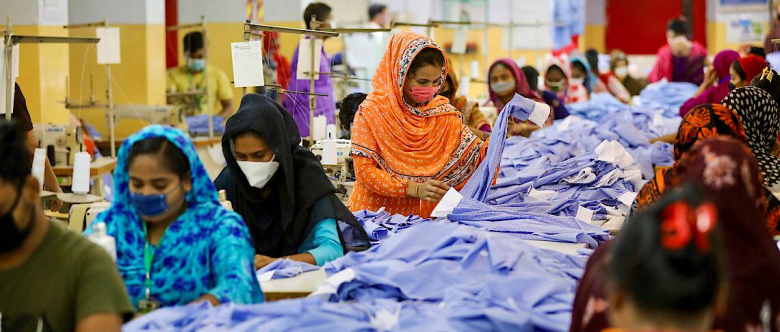The emerging German supply chain law: what we know so far and how to prepare.
German parliament passes new Human Rights Due Diligence Law – weaker than international standards but with some baby teeth
Update: June 24th 2021
On 11 June 2021, the German parliament adopted the Human Rights Due Diligence Law (Sorgfaltspflichtengesetz) ¹. The law is scheduled to come into force in 2023 and initially applies to companies that have their headquarters in Germany and employ more than 3,000 employees. From 2024 it will be extended to companies with more than 1,000 employees. In a move away from international standards the law only requires that companies must identify risks of ‘acute or imminent’ human rights violations and environmental destruction from direct suppliers, the law does not require companies to undertake thorough and systematic due diligence on suppliers further down the supply chain but states that this due diligence of indirect suppliers can be done on an ‘ad-hoc’ basis.
The new law obliges large companies to ensure that they fulfill their human rights and environmental due diligence duties with regard to their supply chains (including the establishment of risk management approach, the definition of responsibilities within the company, conducting a regular risk analysis, declaration of policies, the establishment of prevention measures and complaints mechanisms, conducting mitigation measures etc.). On an annual basis, companies will need to document and report their findings and actions to the Federal Office for Economic Affairs and Export Control (BAFA). BAFA will be empowered to initiate administrative action or impose fines of up to 2% of annual turnover on companies that fail to carry out their obligations.
Challenges are presented to German companies – the European Legislation is expected to go beyond these human rights due diligence requirements and the inclusion of environmental due diligence imposes a new expectation. There are many uncertainties about enforcement and application – contact us for more information and support to implement.
[1] Gesetz über die unternehmerischen Sorgfaltspflichten zur Vermeidung von Menschenrechtsverletzungen in Lieferketten (Sorgfaltspflichtengesetz): https://www.bundestag.de/dokumente/textarchiv/2021/kw16-de-lieferkettengesetz-834842
Europe’s largest economy, Germany, is set to be the next European country (after the UK and France) to pass mandatory supply chain human rights due diligence legislation in 2021. Find out why Germany is pushing for this law, the roadblocks, and how to prepare for implementation.
In 2016 the German government adopted a National Action Plan (NAP) for Business and Human Rights that outlined expectations where companies need to adhere to the obligations and responsibilities stipulated in the United Nations Guiding Principles on Business and Human Rights (UNGPs). In 2018 Germany went one step further – the German government promised to introduce legislation to regulate corporate due diligence in supply chains if, more than 50% of German companies with 500+ did not meet NAP requirements voluntarily by 2020. In July 2020, the Federal Minister for Economic Cooperation and Development, Gerd Müller, and the Federal Minister of Labor and Social Affairs Hubertus Heil (from the Social Democratic Party) spoke of the “miserable failure of the NAP monitoring process.” Only 455 out of approximately 2,250 surveyed companies (with more than 500 employees) even responded to the questionnaire to assess the implementation of social and ecological standards along supply chains. Making good on its promise, Germany announced it will implement a mandatory supply chain due diligence law.
Discussions around a legal framework continue to be heated. While supporters of a law see an urgent need to create a level playing field among companies that ensures there is no free-riding, business associations warn that a law could result in distortion of competition and create detrimental effects for German enterprises, especially Small and Medium Enterprises (SMEs), in the international market. NGOs want the law to go further and include, among other demands, gender-specific requirements. Consumer protection organizations are welcoming the increased transparency for consumers that the law will provide. In a public opinion poll released in September this year, 75% of respondents were in favor of a law that would make German companies liable for human rights violations in the manufacturing of their products. Of those favoring the law, 91% regard it as the government’s responsibility to ensure social standards and human rights are respected during production abroad.
 Image Source: Mohammad Ponir Hossain/Reuters
Image Source: Mohammad Ponir Hossain/Reuters
While there is cross-party support for a law per se, discussions around some of its key principles remain controversial, especially on the question of liability. Müller and Heil argue that the law should include legal implications for companies that neglect human rights in their supply chains. Given the impact of COVID-19 and the difficult economic environment for companies the Federal Minister for Economic Affairs and Energy, Peter Altmeier, argues only for financial penalties or legal implications for companies with more than 5,000 employees.
The cornerstones of the German Supply Chain law may be clear, but its details, requirements, and implications for companies are not.
The upcoming German supply chain legislation should provide a regulatory framework that will create a level playing field but at the same time recognize voluntary commitments and activities that go above and beyond. Ideally, the law will further encourage private sector cooperation. Considering the complexity and interconnectivity of global supply chains, the law should recognize that joint efforts can lead to a greater impact than unilateral endeavors.
As more and more countries are drafting business and human rights legislation, international cooperation and collaboration are critical. While the drafting of a German supply chain law is commendable, a uniform European regulation would arguably be a more effective solution. Laws such as French Duty of Vigilance Law, the UK Modern Slavery Act, the Swiss Responsible Business Initiative, and similar regulatory measures in the making in a number of other countries, including the Netherlands, Belgium, and Finland lead to a patchwork of regulations that is challenging to navigate.
While the requirements of the German and EU supply chain human rights laws are still to be determined, companies are encouraged to lay the foundation for their due diligence programs now. On 1 December 2020, the European Council of the European Union approved conclusions calling on member states and the Commission to promote human rights in global supply chains and decent work worldwide. The Council asks the Commission to launch an EU Action Plan focusing on shaping global supply chains sustainably, promoting human rights, social and environmental due diligence standards, and transparency by 2021. The Council also called on member states to step up their efforts to effectively implement the UN Guiding Principles on Business and Human Rights, including through new or updated National Action Plans containing a mix of voluntary and mandatory measures. Together with the announcement just a week later of an EU global human rights sanction regime, it appears that a more comprehensive legal framework for human rights in supply chains is on the agenda in Europe.
ELEVATE has extensive experience working with brands and retailers to meet the requirements of the UK and Australian Modern Slavery Acts, the French Duty of Vigilance Law, and the US Uyghur Forced Labor Prevention Act. Successful companies develop strong policies and procedures for procurement and purchasing practices, undertake risk-based segmentation activities to build a logical responsible sourcing program, engage with suppliers to build visibility down to the raw material level, conduct effective monitoring activities, drive remediation and focus on consistent improvement strategies and access to grievance channels for workers along the supply chain. Importantly, companies also need to report transparently on progress – above and beyond the basic level of supply chain reporting which is currently the norm.
These blogs are written by ELEVATE staff members or associates and the views and opinions expressed are not necessarily those of ELEVATE.
About the authors

